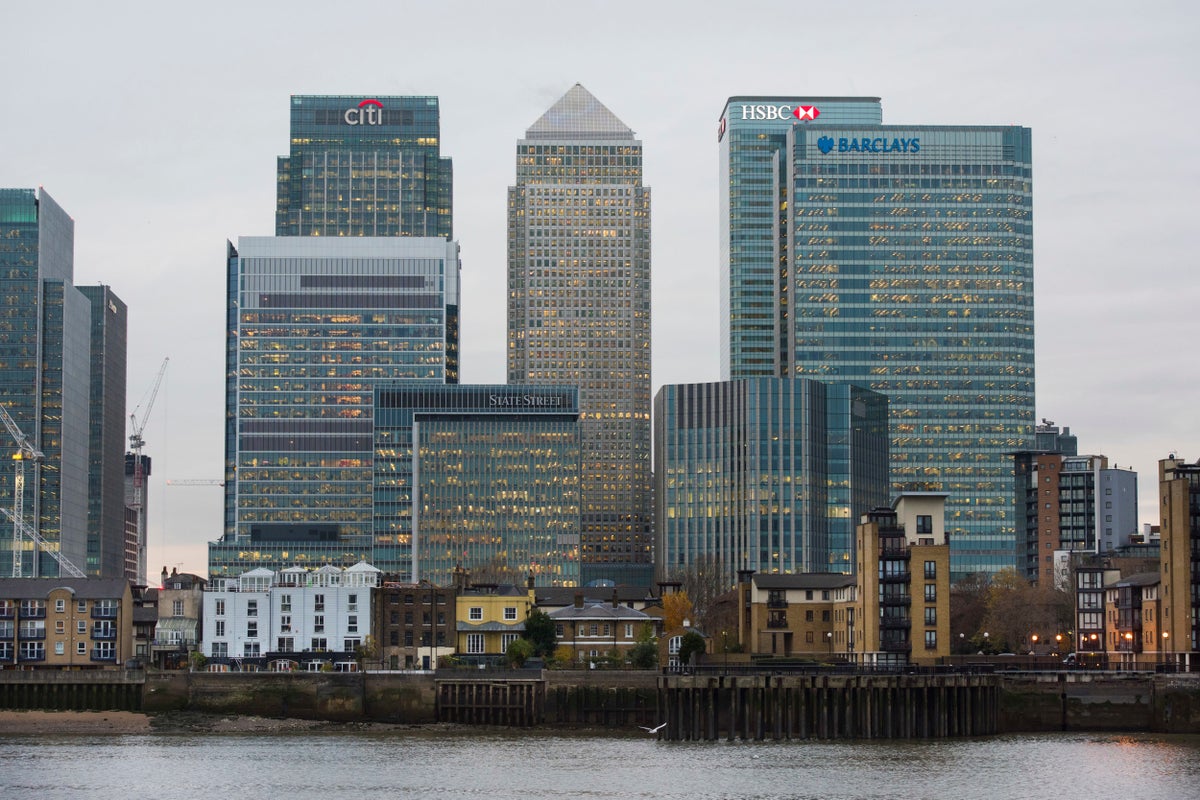
Britain’s FTSE 100 plunged by nearly 2 per cent in early morning trading on Monday despite UBS’s £2.7 billion rescue deal to save troubled lender Credit Suisse.
The takeover, announced on Sunday night, failed to convince spooked investors concerned about another meltdown in the global banking system, with 129 points shaved off the value of the 100 biggest firms listed in the UK.
The FTSE 250 was also down 1 per cent, with banking stocks across the two indexes slumping by 5.3 per cent.
By 2pm in London, the FTSE 100 was around 0.6 per cent higher for the session, with early session gains seen also on the Dow Jones and S&P 500 on Wall Street.
Nevertheless, market worries continued to particularly hit other banking stocks, which led the fallers in London and Europe’s other key markets.
The recent collapse of US-headquartered Silicon Valley Bank has continued to send shockwaves through the banking sector, bringing back grim memories of the 2008 financial crash which had major implications for economies across the globe.
Regulators in Washington - and in London, where SVB had a UK division - stepped in to guarantee customer deposits in the failed tech lender but the moves have so far failed to calm market jitters.
Credit Suisse, founded in 1856 and which had managed more than £1 trillion in assets, has had troubles for years but appears to have been tipped over the age by SVB’s collapse.
It was hoped that the sale of the Swiss bank - the country’s second-biggest lender and viewed by some analysts as ‘too important to fail’ - would calm anxieties in the markets but there was no evidence of that on Monday morning.
Markets in Asia were struggling earlier in the morning, with shares in Hong Kong falling by more than 3 per cent as the banking sector took a battering.

“With Credit Suisse shareholders and some bondholders taking a huge hit, banks in Asia have taken a hit on similar concerns about (some of their) bond-holding values,” said Michael Hewson, chief market analyst at CMC Markets.
“While the weekend deal still presents the Swiss National Bank and Swiss Government with untold headaches, with the size of the newly merged bank set to dwarf the size of the Swiss economy.
“The phrase too big to fail really does spring to mind here, and this morning’s weakness in Asia markets serves to reinforce concerns about these types of writedowns and any spillover effects on the rest of the banking sector.”
The Credit Suisse deal was announced on Sunday evening, as UBS agreed to pay around £2.7 billion for its former rival. The deal was brokered by the same Swiss regulators which had on Wednesday said they would lend up to £45 billion to Credit Suisse to keep it afloat.
“Having come off the worst week for European equity markets this year, volatility looks set to continue this week now that the fate of Credit Suisse appears to have finally been sealed,” Mr Hewson said.
UBS’s merger was welcomed internationally, with the US Federal Reserve and Treasury saying Switzerland had moved to “support financial stability”. British chancellor Jeremy Hunt and the Bank of England have also hailed the deal.
The 167-year-old Credit Suisse was brought to the brink of financial calamity last week despite a £45bn emergency loan from Switzerland’s central bank.

The deal was made in tandem with six major central banks, including the Bank of England, taking coordinated action to boost dollar flows to help stem the crisis of confidence gripping more lenders.
The so-called swap line arrangement, involving the US Federal Reserve, Bank of Japan, European Central Bank, Bank of Canada and Swiss National Bank (SNB) aimed to "enhance the provision of liquidity" and the "smooth functioning of US dollar funding markets".
It was hoped that the seven-day-a-week facility, which is due to run until at least the end of April, will be enough to bolster market confidence over the health of other banks, particularly US regional lenders.
Switzerland said the Credit Suisse deal, which was essentially forced on UBS, was aimed at shoring up confidence in the market.
UBS’s own shares took a 12 per cent hit in the aftermath of the deal. Deutsche Bank was down 10 per cent, Barclays fell 6 per cent and Lloyds saw a tumble of 4 per cent.
Credit Suisse employs around 5,500 people in the UK, but authorities here were keen to stress on Sunday that the country’s financial system is still safe.
The Bank of England said: "We welcome the comprehensive set of actions set out by the Swiss authorities today in order to support financial stability.
"We have been engaging closely with international counterparts throughout the preparations for today’s announcements and will continue to support their implementation.
"The UK banking system is well capitalised and funded, and remains safe and sound."
UBS said job losses were expected at Credit Suisse’s UK office after the historic sale of the Swiss bank, with an impact on the lender’s British workers seen as being “inevitable”.
The former chief executive of UBS in the UK, Mark Yallop, said he thinks job losses will be “inevitable” as a result of the merger and chopping down the investment bank.
He told the BBC’s Today programme: “The two firms together employ about 120,000 staff, of which about 11,000 sit in London, and I think it’s inevitable that a merger of this sort will result in some further job losses.
“I would imagine those would be concentrated in the risky investment banking business at Credit Suisse which is partly the cause of the problems the firms is experiencing.
“And in middle-office, technology and operational roles where bringing two firms together will mean you can run one bigger firm, without doubling up the infrastructure needed to manage it.”







